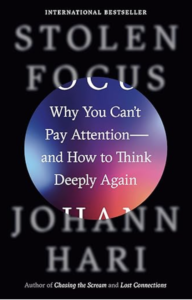
Stolen Focus: Why You Can’t Pay Attention and How to Think Deeply Again
Johann Hari
2022
Read: 2023
Education/Leadership, Non-Fiction, Reading Now
My friend Jenn loaned me this book. That means I read it as a paperback, instead of Kindle-ing it. I read less than 10% of my books in hard copy. This was a perfect one to choose to be part of that 10%.
This is a book about why we are distracted, and the forces at work doing their best to increase our levels of distraction. It’s not a conspiracy theory book, but it is an “open your eyes and know that there are forces at work trying to keep you from being your best” book.
There is nothing shocking about this book, but the way Johann Hari keeps piling it on makes it clear that we have true problems in our society, and most of us, myself included, have big problems we have to overcome as individuals.
Some of my takeaways:
- I am sad that we are not a nation of readers. I see it. So many people I talk with don’t have the time to read books. Even a five-minute essay is too much for most. I am surprised that magazines like The Atlantic or The New Yorker, with their long and in-depth articles, continue to survive. Hari emphasizes that the world is not simple, and it cannot be understood in brief scannable messages.
- The best part of the book focuses on how interrupted our lives have become. Most of us do not have time for thought, silence, day-dreaming, reflection, or problem-solving. And interruptions are more disruptive to our thinking than we think. He pushes the idea of flow – one of my favorite concepts and always a goal in my life – and how flow is the opposite of our normally distracted life. “Slowness nurtures attention. Speed shatters it.” (p. 36) “Fragmentation makes you smaller, shallower, and angrier. Flow makes you bigger, deeper, calmer.” (p. 62)
- The forces behind the Internet – the engineers and profiteers – are actively trying to get, then keep our attention. Outrage works. People click on outrage. Infinite scrolls work. Rabbit holes work. Be aware and avoid them. “As we get manipulated by the outrage, we become, as a species, less rational, less intelligent, and less focused.” (P. 141) And . . . it’s threatening our democracy.
- The big societal idea in this book is to ban surveillance capitalism. Like lead paint and CFCs from aerosol cans, it is hurting or threatening to hurt us. Companies who surveil us know who we are and what makes click (literally), and they work tirelessly to manipulate us for purchasing or voting reasons. It’s too much. I think it’s hard to ban – if it’s not Facebook or X developing profiles on us, it’s going to be a foreign entity. I think it’s worth studying, and I need to learn more.
Overall, a fantastic read. Hari put a lot of different ideas together and made an impact through his synthesis. I recommend it highly. (If you’re into books. 🙂 )
Leave A Comment